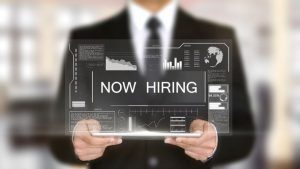
What Employers Should Know About Vaccination Requirements, Screenings, and Return to Work Plans
More than 100 million doses of COVID-19 vaccines have been administered in the United States and many companies are hoping this will signal a significant return to work for most employees. But, before that happens, there may be pending legal questions about vaccination requirements ahead.
Meredith (Merry) Campbell, an employment attorney with Shulman Rogers, hosted a webinar that discussed vaccine protocols for employers and continued virus screening requirements that will likely become a key part of daily human resources management. One of the most common questions that many employers will be faced in the coming weeks and months is whether or not they can mandate onsite employees receive one of the COVID-19 vaccines that have been authorized by the U.S. Food and Drug Administration.
In short, Campbell said yes, employers could require their employees to receive the vaccine. But, there is a catch. Before an employer can make it a requirement, they will have to demonstrate that vaccination is necessary to prevent a direct threat to co-workers or the general public if the business is customer-facing.
Campbell said businesses that do require vaccination would also have to provide “reasonable accommodation” for those employees who cannot or will not receive a vaccine due to religious exemption, medical concerns, or otherwise.
If an employer requires an employee to receive a vaccine, Campbell said the business must allow that employee to receive the preventative medication.
She noted that many companies provide incentives for employees to receive the vaccine, including paid time off from work or other rewards.
“Most employers we’re talking to are not requiring them, but they are encouraging vaccines,” Campbell said. “Companies should go ahead and implement plans now that more vaccines are available for people.”
Campbell pointed to so-called vaccine passports, documents that confirm an individual has been vaccinated against COVID-19, currently being used in countries like Israel and discussed across Europe, could become common in the United States. As a result, companies must be ready to implement strategies that accommodate this kind of documentation. Campbell, who said she would be shocked if the U.S. doesn’t implement this in the near future, warned such documentation would potentially impact hiring and how companies interact with clients.
As COVID infection rates decline or become stable, Campbell said many employers are looking to bring their employees back under one roof. Even before employees may have an opportunity to receive a vaccine, Campbell said businesses could bring them back if the type of job requires one to be on-site, such as retail work, factory work, or even in the life sciences.
“You can’t do science at home,” she quipped about the laboratories that many biopharma companies require to conduct their research.
If employers are bringing workers back, she said they would be required to screen employees to prevent transmission of the virus. But, she cautioned employers to be careful about the questions they ask in such a screening. The questions can only relate to possible exposure to the virus or COVID-19 symptoms outlined by the U.S. Centers for Disease Control and Prevention, which includes fever, chills, cough, fatigue, headache, nausea, or vomiting, loss of taste or smell, and a few more. Asking too many questions can lead to a potential violation of the Health Insurance Portability and Accountability Act of 1996 (HIPAA).
“You can’t ask about any health conditions beyond COVID,” she said. And added it was important to not reveal any personal information about other employees.
Campbell recommended employers implement a return-to-work plan that sticks close to government guidance, including masks, social distancing, and other measures. That way, she said companies would avoid any liability.
In addition to questions regarding vaccines and health screenings, Campbell also discussed work-related travel, federal stimulus, and unemployment benefits changes. She also urged employers to be mindful of the Me Too, and Black Lives Matter movements, as well as the rise of anti-Asian violence.
For more information on this topic, you can visit Shulman Rogers website or contact Merry Campbell -> here.





